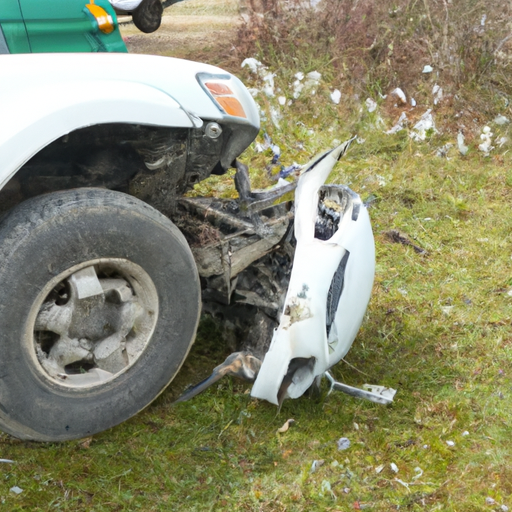Have you recently been involved in a trucking accident in Providence, Utah? The aftermath of such an accident can be overwhelming, with medical bills piling up and the physical and emotional toll taking its toll on you. This is why it is crucial to seek the assistance of a reliable and experienced Truck Accident Lawyer in Providence, Utah. With their expertise in personal injury law, they can guide you through the legal process, fight for your rights, and help you obtain the compensation you deserve. Don’t navigate this complex situation alone – reach out to a Truck Accident Lawyer today for a consultation and let them advocate for you.

What to do after a truck accident
Getting into a truck accident can be a terrifying experience, but it’s important to stay calm and take the necessary steps to ensure your safety and protect your rights. Here is a comprehensive guide on what to do after a truck accident:
1. Stay at the scene
Regardless of the severity of the accident, it’s crucial that you never leave the scene. Leaving the scene of an accident, especially one involving a truck, can have legal consequences. Stay put until authorities arrive and tell you it’s safe to leave.
2. Check for injuries
Check yourself and others involved in the accident for any injuries. If someone is seriously injured, call for medical assistance immediately. Even if there are no visible injuries, it’s still a good idea to seek medical attention to ensure that there are no underlying injuries or complications.
3. Call the police
Contacting the police after a truck accident is crucial, as they will document the incident and create an official report. This report will serve as valuable evidence when dealing with insurance companies and legal proceedings.
4. Gather evidence
While waiting for the police to arrive, take the time to gather as much evidence as possible. Collect the truck driver’s contact information, license plate number, insurance details, and any other relevant documentation. This information will be essential when determining liability.
5. Take photos
Use your phone or a camera to take clear and detailed photos of the accident scene. Capture the damages to both vehicles, skid marks on the road, traffic signs, and any other relevant details. These photos can provide compelling visual evidence of the accident and help establish fault.
6. Get witness statements
If there were any witnesses to the accident, ask for their contact information and statements. Their accounts of what happened can provide additional support to your case.
7. Seek medical attention
Even if you believe your injuries are minor, it’s important to seek medical attention after a truck accident. Some injuries may not be immediately noticeable but can have long-term consequences. Prompt medical treatment will not only ensure your well-being but also create a medical record that can strengthen your case.
8. Notify your insurance company
Inform your insurance company about the accident as soon as possible. Provide them with all the necessary details and documentation. Be cautious when speaking to insurance adjusters and avoid admitting fault or making any statements that could be used against you later.
By following these steps, you can protect yourself and your rights after a truck accident and maximize your chances of receiving fair compensation for your damages.
Determining liability in a truck accident
When it comes to determining liability in a truck accident, several parties may be held responsible. Understanding who is at fault is crucial for pursuing a successful personal injury case. Here are some common factors that contribute to truck accidents and the potential parties at fault:
1. Truck driver negligence
One of the most common causes of truck accidents is driver negligence. This can include violations of traffic laws, driving under the influence of drugs or alcohol, or driving fatigue. If the truck driver’s actions caused the accident, they may be held liable for the damages.
2. Trucking company negligence
Trucking companies have a responsibility to ensure that their drivers are properly trained, vehicles are well-maintained, and federal regulations are followed. If the company failed to meet these obligations, they may be held accountable for the accident.
3. Vehicle maintenance issues
Poorly maintained trucks can pose serious risks on the road. If the accident resulted from mechanical failures, such as faulty brakes or tire blowouts, the party responsible for maintaining the vehicle may be held liable.
4. Cargo-loading negligence
Improperly loaded cargo can lead to unbalanced trucks and shifting loads, causing accidents. If the accident was caused by cargo that was improperly secured or loaded, the party responsible for loading the cargo may be held responsible.
5. Manufacturer defects
Defective truck parts, such as faulty brakes or steering systems, can contribute to accidents. In such cases, the manufacturer may be held liable for the damages.
6. Government entity negligence
In some instances, poorly designed or maintained roads, inadequate signage, or other factors related to road infrastructure can contribute to truck accidents. In these cases, government entities responsible for road maintenance may be held accountable.
Determining liability in a truck accident can be complex and requires a thorough investigation. An experienced truck accident lawyer can help gather evidence, analyze the circumstances surrounding the accident, and identify the responsible parties.
Benefits of hiring a truck accident lawyer
After a truck accident, seeking legal representation from a skilled truck accident lawyer can greatly increase your chances of obtaining fair compensation. Here are some benefits of hiring a truck accident lawyer:
1. In-depth knowledge of truck accident laws
Truck accident laws can be complex and vary from state to state. A knowledgeable truck accident lawyer will have a deep understanding of these laws and how they apply to your case. This expertise allows them to navigate the legal system effectively and ensure that your rights are protected.
2. Experience dealing with insurance companies
Insurance companies often try to minimize their payout or deny claims altogether. A truck accident lawyer has experience negotiating with insurance companies and can fight on your behalf to secure the compensation you deserve. They will handle all communication with the insurance company, protecting you from making any costly mistakes.
3. Proper evaluation of damages
A skilled truck accident lawyer will assess the full extent of your damages, taking into account medical expenses, lost wages, pain and suffering, property damage, and other factors. By accurately evaluating your damages, they can pursue maximum compensation on your behalf.
4. Investigation and gathering evidence
Building a strong case requires a thorough investigation and gathering of evidence. A truck accident lawyer has the resources and expertise to collect critical evidence, such as police reports, witness statements, expert testimonies, and surveillance footage. This evidence will strengthen your case and help establish liability.
5. Negotiating fair compensation
Insurance companies often try to settle for the lowest possible amount. A skilled truck accident lawyer will negotiate aggressively on your behalf to ensure you receive fair compensation for your injuries and damages. They will consider the long-term consequences of the accident and fight for a settlement that adequately covers your current and future needs.
6. Representation in court
If a fair settlement cannot be reached through negotiation, a truck accident lawyer will be prepared to take your case to court. They will represent your best interests, presenting your case persuasively and advocating for maximum compensation. Having strong legal representation in court can make a significant difference in the outcome of your case.
Hiring a truck accident lawyer is an investment in protecting your rights and receiving the compensation you deserve. Their expertise and dedication will guide you through the legal process, alleviating the stress and uncertainty that often accompanies a truck accident.
Statute of limitations for truck accident claims
If you’ve been involved in a truck accident, it’s important to understand the statute of limitations for filing a personal injury claim. The statute of limitations determines the time limit within which you must file your claim. Failure to file within this timeframe may result in losing your right to seek compensation. Here’s what you need to know:
Understanding the time limit
The specific statute of limitations for truck accident claims varies from state to state. In most states, the time limit is generally two to three years from the date of the accident. It’s crucial to consult with an experienced truck accident lawyer to understand the statute of limitations applicable to your case.
Exceptions to the statute of limitations
Certain circumstances may extend or toll the statute of limitations. For example, if the injured party is a minor at the time of the accident, the statute of limitations may not begin until they reach the age of majority. Additionally, if the injured party is mentally incapacitated or can prove that they had no knowledge of their injuries, the statute of limitations may be extended.
Importance of timely action
Filing your truck accident claim as soon as possible is crucial. Delaying your claim could result in the loss of evidence, unreliable witness testimony, and difficulty in establishing liability. Acting promptly allows your lawyer to conduct a thorough investigation, build a strong case, and negotiate with insurance companies on your behalf.
Remember, each case is unique, and there may be specific factors that affect the statute of limitations for your truck accident claim. Consulting with a knowledgeable truck accident lawyer is the best way to ensure you comply with all legal requirements and protect your right to seek compensation.

Common causes of truck accidents
Truck accidents can occur due to a variety of factors, many of which are preventable. Understanding the common causes of truck accidents can help you stay vigilant on the road and take precautions to protect yourself. Here are some of the leading causes of truck accidents:
1. Driver fatigue
Long hours on the road can lead to driver fatigue, impairing the truck driver’s ability to react quickly and make sound judgments. Fatigue can be caused by irregular work schedules or inadequate rest breaks, increasing the risk of accidents.
2. Distracted driving
Distracted driving is a significant problem among all motorists, including truck drivers. Engaging in activities such as texting, talking on the phone, eating, or using in-cab technology diverts a driver’s attention from the road and increases the likelihood of accidents.
3. Speeding
Speeding is a leading cause of accidents on our roadways. When trucks travel at high speeds, they require more time and distance to come to a stop, increasing the risk of rear-end collisions and other serious accidents.
4. Drunk driving
Operating a truck under the influence of alcohol or drugs is illegal and extremely dangerous. Impaired judgment, reduced reaction time, and compromised coordination can lead to catastrophic accidents.
5. Improper truck maintenance
Truck maintenance is crucial for safe operation on the road. Neglecting routine maintenance, such as checking brakes, tires, and lights, can lead to mechanical failures and accidents.
6. Traffic violations
Truck drivers, just like any other motorists, are not immune to violating traffic laws. Running red lights, making illegal turns, failure to yield, and disregarding speed limits can all contribute to truck accidents.
By understanding these common causes of truck accidents, you can be more aware of potential dangers on the road and take proactive measures to protect yourself and others.
Types of compensation available in truck accident cases
If you’ve been injured in a truck accident, you may be entitled to various types of compensation for your damages. Here are some of the common types of compensation available in truck accident cases:
1. Medical expenses
A truck accident can result in significant medical expenses, including hospital bills, doctor visits, physical therapy, prescription medications, and ongoing medical treatment. Compensation can cover both current and future medical costs.
2. Lost wages
If your injuries prevent you from working, you may be entitled to compensation for lost wages. This includes any wages you have already lost due to the accident, as well as future earning capacity if your injuries are expected to affect your ability to work in the long term.
3. Pain and suffering
Truck accidents can cause physical pain, emotional trauma, and long-lasting suffering. Compensation for pain and suffering is designed to provide financial relief for the physical and emotional distress you have endured as a result of the accident.
4. Property damage
In addition to personal injuries, truck accidents often result in significant property damage. Compensation can cover the cost of repairing or replacing your vehicle, as well as any other damaged property, such as personal belongings.
5. Punitive damages
In cases involving particularly egregious conduct by the at-fault party, punitive damages may be awarded. These damages go above and beyond compensatory damages and are intended to punish the responsible party and deter similar behavior in the future.
The specific types and amounts of compensation you may be eligible for will depend on the circumstances of your truck accident and the extent of your injuries. Consulting with a knowledgeable truck accident lawyer is crucial for assessing your case and pursuing maximum compensation for your damages.
Understanding truck accident insurance claims
If you’ve been involved in a truck accident, navigating the insurance claims process can be challenging. Understanding the different types of insurance coverage, as well as your rights and responsibilities, is crucial. Here’s what you need to know about truck accident insurance claims:
No-fault insurance
Some states have a no-fault insurance system, which requires each party involved in an accident to file a claim with their own insurance company, regardless of who caused the accident. No-fault insurance typically covers medical expenses and lost wages, regardless of fault.
Third-party claims
In situations where the truck driver or another party is at fault for the accident, you may have grounds for a third-party claim. This involves filing a claim against the at-fault party’s insurance company and seeking compensation for your injuries and damages.
Uninsured/underinsured motorist coverage
Uninsured/underinsured motorist coverage provides protection if the at-fault party does not have insurance or has insufficient coverage to compensate you adequately for your damages. If your own insurance policy includes this coverage, you may be able to make a claim against your own policy.
Dealing with insurance adjusters
Insurance adjusters work for insurance companies and their goal is to minimize the amount of money the company pays out in claims. It’s important to understand that their interests are not aligned with yours. Be cautious when speaking with insurance adjusters and avoid providing any recorded statements or signing any documents without consulting with a truck accident lawyer first.
Importance of legal representation
Navigating the complexities of truck accident insurance claims can be overwhelming, especially while recovering from injuries. Seeking legal representation from a skilled truck accident lawyer can ensure that your rights are protected, your claims are properly assessed, and you receive fair compensation for your damages.
Proving negligence in a truck accident case
To successfully pursue a personal injury claim after a truck accident, it’s essential to prove negligence on the part of the responsible party. Here are the key elements of proving negligence:
1. Duty of care
The first step in proving negligence is establishing the existence of a duty of care. This means demonstrating that the responsible party had a legal obligation to exercise reasonable care to prevent harm to others on the road, including you.
2. Breach of duty
Once duty of care is established, it’s necessary to prove that the responsible party breached that duty. This involves showing that they failed to meet the expected standard of care, such as violating traffic laws, driving under the influence, or not properly maintaining the truck.
3. Causation
Causation must be proven to show that the breach of duty directly caused the accident and resulting injuries. This requires establishing a clear link between the defendant’s actions or omissions and the harm you have suffered.
4. Damages
Finally, you must demonstrate that you have suffered actual damages as a result of the accident. This can include physical injuries, medical expenses, lost wages, pain and suffering, and other related losses.
To establish negligence in a truck accident case, it’s crucial to gather evidence, such as police reports, witness statements, and expert opinions. An experienced truck accident lawyer can help you build a strong case by conducting a thorough investigation, analyzing the evidence, and presenting your claims persuasively.

Steps to take if you were injured in a truck accident
If you have been injured in a truck accident, taking the right steps immediately following the accident can greatly impact your ability to seek compensation. Here are the steps you should take:
1. Document your injuries
Seek immediate medical attention and document all of your injuries. Keep track of medical records, bills, prescriptions, and any other relevant documents related to your injuries and treatment. This evidence will be crucial when calculating damages and establishing the extent of your injuries.
2. Preserve evidence
Preserve any evidence related to the accident, including photographs of the scene, vehicle damage, skid marks, and any other details that may help establish liability. Additionally, keep a record of any witness contact information, as their statements may be valuable evidence.
3. Obtain a copy of the police report
Request a copy of the police report filed at the scene of the accident. This report contains important details about the accident, including statements from the parties involved, descriptions of damages, and any identified violations of traffic laws.
4. Avoid giving statements to insurance adjusters
Insurance adjusters may try to contact you to gather information or obtain a recorded statement. It’s important to remember that their goal is to protect their company’s interests, not yours. Before providing any statements, consult with a truck accident lawyer to ensure you do not inadvertently say anything that could be used against you.
5. Contact a truck accident lawyer
Seeking legal representation from a skilled truck accident lawyer is crucial for protecting your rights and pursuing fair compensation. A lawyer will guide you through the legal process, negotiate on your behalf, and ensure that your case is pursued effectively.
By following these steps, you can safeguard your rights and increase your chances of obtaining the compensation you deserve after a truck accident.
FAQs about truck accidents
-
How long do I have to file a truck accident claim? The statute of limitations for filing a truck accident claim varies from state to state. In most cases, it is between two to three years from the date of the accident. However, it’s important to consult with a truck accident lawyer to determine the specific deadline applicable to your case.
-
Can I still recover compensation if I was partially at fault? The concept of comparative negligence comes into play when multiple parties are deemed partially at fault for an accident. The amount of compensation you can recover may be reduced based on the percentage of fault attributed to you. Consult with a skilled truck accident lawyer to understand how comparative negligence laws apply to your case.
-
What damages can I recover in a truck accident lawsuit? In a truck accident lawsuit, you may be able to recover damages such as medical expenses, lost wages, pain and suffering, property damage, and more. The specific damages you can recover depend on the circumstances of your case.
-
How long will it take to resolve my truck accident case? The timeline for resolving a truck accident case varies depending on several factors, including the complexity of the case, the extent of injuries, and the willingness of the insurance company to negotiate a fair settlement. Some cases may be resolved in a matter of months, while others may take longer. Consulting with a truck accident lawyer will give you a better understanding of the expected timeline for your specific case.
-
What if the truck driver denies responsibility for the accident? If the truck driver denies responsibility for the accident, it’s crucial to have strong evidence and legal representation to support your claim. A skilled truck accident lawyer can build a compelling case on your behalf, utilizing evidence such as police reports, witnesses, and expert opinions, to establish liability and pursue fair compensation.
Remember, every truck accident case is unique, and it’s important to consult with a truck accident lawyer to receive personalized legal advice based on the specific details of your situation.



